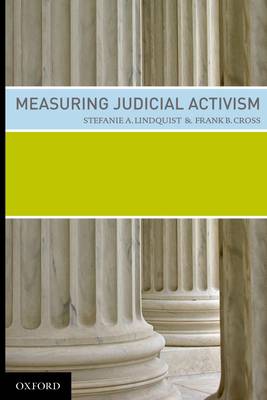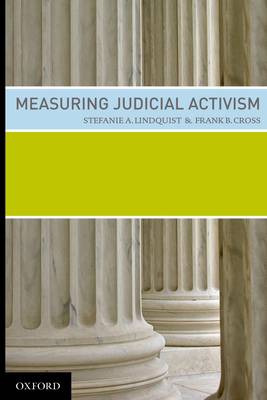
Bedankt voor het vertrouwen het afgelopen jaar! Om jou te bedanken bieden we GRATIS verzending (in België) aan op alles gedurende de hele maand januari.
- Afhalen na 1 uur in een winkel met voorraad
- In januari gratis thuislevering in België
- Ruim aanbod met 7 miljoen producten
Bedankt voor het vertrouwen het afgelopen jaar! Om jou te bedanken bieden we GRATIS verzending (in België) aan op alles gedurende de hele maand januari.
- Afhalen na 1 uur in een winkel met voorraad
- In januari gratis thuislevering in België
- Ruim aanbod met 7 miljoen producten
Zoeken
€ 225,95
+ 451 punten
Omschrijving
Measuring Judicial Activism supplies empirical analysis to the widely discussed concept of judicial activism at the United States Supreme Court. Complaints about activist Court decisions are common within contemporary political discourse, but these objections often have little substantive meaning beyond the speaker's disagreement with particular case outcomes. Frequently debated by legal scholars, judicial activism is shaped by the participants' ideological perspectives as well as by their subjective views regarding ambiguous constitutional provisions. Although no study can be perfectly objective, Measuring Judicial Activism seeks to move beyond these more subjective debates by conceptualizing activism in non-ideological terms, identifying specific empirical dimensions to the concept, and measuring those dimensions using systematic social scientific techniques. In so doing, the book allows the authors to assess the relative "activism" of recent justices on the Court.
Specificaties
Betrokkenen
- Auteur(s):
- Uitgeverij:
Inhoud
- Aantal bladzijden:
- 192
- Taal:
- Engels
Eigenschappen
- Productcode (EAN):
- 9780195370850
- Verschijningsdatum:
- 13/04/2009
- Uitvoering:
- Hardcover
- Formaat:
- Ongenaaid / garenloos gebonden
- Afmetingen:
- 155 mm x 236 mm
- Gewicht:
- 430 g

Alleen bij Standaard Boekhandel
+ 451 punten op je klantenkaart van Standaard Boekhandel
Beoordelingen
We publiceren alleen reviews die voldoen aan de voorwaarden voor reviews. Bekijk onze voorwaarden voor reviews.









